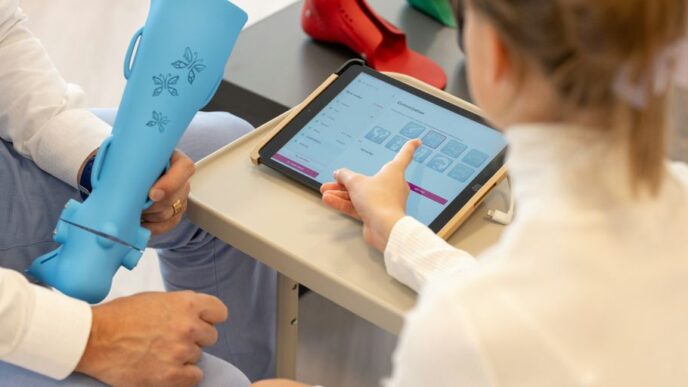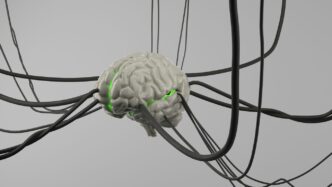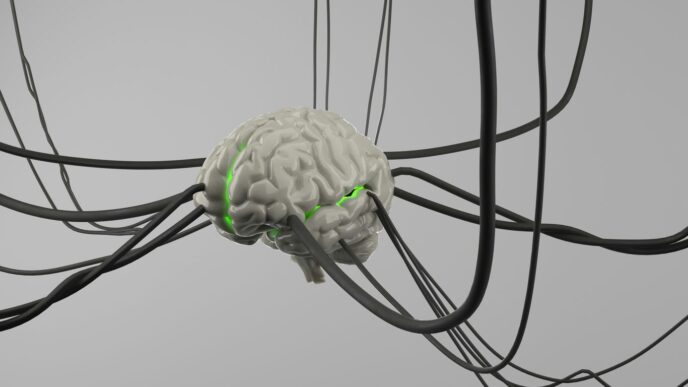AI is changing healthcare in big ways, and 2025 is looking like a key year for these changes. We’re talking about everything from how doctors figure out what’s wrong with you to making sure your treatment is just right for your body. This article will go over some of the most important ways AI is being used in healthcare right now, and what we can expect to see more of very soon. It’s all about making things better, faster, and more personal for patients everywhere. It’s a real ai use case in healthcare.
Key Takeaways
- AI helps doctors diagnose illnesses more accurately and quickly, often better than humans alone.
- Treatment plans are becoming super personalized thanks to AI looking at individual patient data.
- AI is making hospital operations smoother by automating a lot of the paperwork and routine stuff.
- We’re seeing AI predict health issues before they get serious, which means people can get help sooner.
- Integrating AI into existing healthcare systems is a big job, but it’s making patient care much more connected and efficient.
1. Medical Diagnosis Systems

Okay, so medical diagnosis systems powered by AI are getting seriously good. I mean, think about it: computers that can analyze medical images, lab results, and patient histories to spot diseases earlier and more accurately? It’s kind of mind-blowing.
AI algorithms are now capable of detecting conditions with impressive accuracy, sometimes even surpassing human experts.
Like, I read about this study at Massachusetts General Hospital and MIT where AI detected lung nodules with 94% accuracy, while radiologists only got 65%. That’s a huge difference! And in breast cancer detection, the AI had 90% sensitivity compared to 78% for humans. Of course, it’s not about replacing doctors, but giving them a super-powered assistant.
Here’s what AI brings to the table:
- Early Detection: AI can sift through tons of data to find early signs of diseases like cancer, diabetes, and heart problems. This means earlier treatment and better outcomes.
- Improved Accuracy: AI algorithms can pick up on subtle patterns in medical images that humans might miss, leading to more accurate diagnoses.
- Faster Results: AI can analyze data much faster than humans, speeding up the diagnostic process and getting patients the care they need sooner.
AI is also great at analyzing unstructured data. You know, things like doctor’s notes, medical reports, and clinical trial data. AI can turn all that mess into actionable insights, which is super helpful for personalized treatment plans and predicting disease outbreaks. Plus, AI-powered chatbots can handle routine inquiries, freeing up medical staff to focus on more complex cases. It’s all about making healthcare more efficient and effective.
2. Personalized Medicine
Personalized medicine is really taking off, and AI is a big reason why. Instead of a one-size-fits-all approach, doctors can now use AI to create treatment plans tailored to each patient’s unique needs. It’s about getting the right treatment to the right person at the right time. Think of it like this: your medical history, your genes, your lifestyle – all of it gets crunched by AI to figure out what works best for you.
AI analyzes tons of data to predict how you’ll respond to different medications, helping doctors prescribe the most effective treatments while minimizing side effects.
This isn’t just some futuristic dream; it’s happening now. AI-powered platforms are already helping doctors make better decisions about drug prescriptions and avoid those frustrating trial-and-error approaches. It’s about making healthcare more precise and effective.
Here’s how AI is making personalized medicine a reality:
- Genetic Profiling: AI can analyze your genetic code to identify potential risks and tailor treatments accordingly. This is especially useful in areas like oncology, where genetic mutations can significantly impact treatment outcomes. AI in healthcare is really changing the game.
- Lifestyle Integration: It’s not just about your genes; your lifestyle matters too. AI can factor in things like diet, exercise, and environmental exposures to create a more holistic treatment plan.
- Predictive Modeling: AI algorithms can predict how you’ll respond to a particular treatment based on your individual characteristics. This helps doctors choose the most effective therapies and avoid unnecessary interventions.
Personalized medicine isn’t just about better treatments; it’s also about cutting costs. By avoiding unnecessary treatments and focusing on what works best for each patient, we can make healthcare more efficient and affordable. It’s a win-win for everyone.
3. Custom Treatment Design
Coming up with the right treatment plan can be a real headache for doctors. It’s not just about picking something off the shelf; it’s about figuring out what works best for that specific patient. That’s where AI comes in. AI can analyze tons of data to help create treatment plans tailored to each person.
Think about it: AI can look at a patient’s medical history, genetic information, lifestyle, and even how they’ve responded to past treatments. It’s like having a super-powered assistant that never forgets a detail. This can lead to more effective treatments and fewer side effects. Plus, it can save time and money by avoiding treatments that are unlikely to work.
For example, companies like Aitia use machine learning to match patients with the most effective treatments. Oncora Medicals focuses on personalized cancer treatment by analyzing health systems’ data. These are just a couple of examples of how AI agents are changing the game.
Here’s a quick look at some potential benefits:
- More personalized treatment plans
- Reduced trial-and-error in treatment selection
- Improved patient outcomes
- Cost savings
It’s not perfect, of course. Data privacy is a big concern, and integrating AI into existing systems can be tricky. But the potential benefits are huge. By analyzing clinical outcomes and patient data, healthcare providers can make more informed choices about the most effective treatments. This helps reduce trial-and-error in medical interventions. Imagine a future where treatment is designed specifically for you. That’s the promise of custom treatment design with AI.
4. Predictive Analytics
Predictive analytics in healthcare is getting seriously interesting. It’s all about using data to see what might happen in the future, and that’s a big deal when it comes to keeping people healthy. AI can analyze tons of data to spot patterns and risks before they become major problems.
Think about it: AI can look at patient data to predict the likelihood of chronic diseases like heart issues or diabetes. It’s also useful in tracking how diseases spread, which helps authorities take action faster. It’s not just about individual patients, either. AI can help hospitals manage things like patient flow, bed occupancy, and staffing. That means better care for everyone, and less wasted money.
Here’s a quick look at some of the benefits:
- Early Risk Detection: AI can spot early risks for diseases like Alzheimer’s and diabetes, which means people can get preventive care sooner.
- Resource Optimization: Hospitals can use AI to manage resources better, like staffing and bed availability.
- Improved Decision-Making: Healthcare providers can make better choices about treatments by analyzing clinical outcomes and patient data.
It’s not perfect, of course. There are challenges like keeping data private and making sure everything works together smoothly. But the potential is huge. Imagine a world where healthcare is proactive, not reactive. That’s what predictive analytics is all about.
5. Administrative Automation
Healthcare is drowning in paperwork, and honestly, it’s a mess. But AI is stepping in to help with all the tedious, repetitive tasks that bog down staff. Think about it: billing, scheduling, data entry – all things that can be automated, freeing up humans to focus on actual patient care. This shift not only reduces operational costs but also helps to combat staff burnout.
AI’s impact is already being felt. For example, AI-powered virtual assistants are handling patient queries, appointment scheduling, and even prescription refills. This means less time on the phone for nurses and more time for direct patient interaction. Plus, AI can help with regulatory compliance, ensuring that healthcare organizations adhere to standards like HIPAA. It’s a win-win.
Here’s a quick look at some of the benefits:
- Reduced administrative costs
- Improved staff efficiency
- Better patient experience
- Minimized errors in billing and coding
AI is also making a difference in fraud detection. By analyzing claims data, AI algorithms can identify suspicious patterns and prevent fraudulent activities, saving healthcare providers significant amounts of money. It’s like having a super-powered accountant watching over everything.
Ultimately, administrative automation is about making healthcare more efficient and effective. By taking over the mundane tasks, AI allows healthcare professionals to focus on what they do best: caring for patients. It’s a game-changer for the industry.
6. Electronic Health Records Integration
Electronic Health Records (EHRs) are the backbone of modern healthcare, but they can be a real pain to manage without the right tools. AI is stepping in to make EHRs more useful and less of a burden. The goal is to make patient data more accessible and actionable for healthcare providers.
One of the biggest challenges with EHRs is that they often contain a ton of unstructured data. Think doctor’s notes, lab reports, and imaging results. AI can help extract key information from this unstructured data, making it easier to find what you need. This means doctors can spend less time searching for information and more time focusing on patients. EHR systems are evolving rapidly, and AI is a big part of that evolution.
AI can also help with tasks like:
- Data entry: Automating data entry can save time and reduce errors.
- Coding and billing: AI can help ensure that medical codes are accurate and that bills are submitted correctly.
- Clinical decision support: AI can provide doctors with alerts and reminders to help them make better decisions about patient care.
Ultimately, the goal of EHR integration is to improve patient outcomes and reduce costs. By making data more accessible and actionable, AI can help healthcare providers deliver better care more efficiently. It’s not about replacing doctors, but about giving them the tools they need to do their jobs better.
7. Medical Imaging Networks
Medical imaging networks are becoming increasingly important in healthcare. They allow for the sharing of medical images between different healthcare providers, which can improve the quality of care and reduce costs. Think of it as a super-efficient way for doctors to collaborate, even if they’re miles apart.
AI is playing a big role in making these networks more efficient and effective. AI algorithms can be used to automatically analyze medical images, identify potential problems, and prioritize cases for review. This can help radiologists work faster and more accurately, and it can also help to reduce the number of missed diagnoses.
For example, AI can help with early diagnosis of diseases by analyzing medical records, lab data, and imaging results. This leads to timely interventions and better patient outcomes. Plus, AI-driven tools can enhance the analysis of medical images, helping in diagnosing diseases earlier and more accurately.
AI is also being used to improve the quality of medical images. AI algorithms can be used to reduce noise, enhance contrast, and correct for artifacts. This can make it easier for radiologists to see important details in the images, which can lead to more accurate diagnoses. Generative techniques are also being used to enhance clarity and reduce scan times, making the whole process better for everyone involved.
AI can also help prioritize incoming medical cases, ensuring the most urgent ones are routed to the appropriate healthcare professionals quickly. This improves overall patient care and reduces delays in diagnosis and treatment. It’s all about getting the right information to the right people at the right time.
8. Secure Data Exchange
In healthcare, data is everything. It’s how doctors make diagnoses, how researchers find cures, and how hospitals run efficiently. But all that data needs to be shared, and it needs to be shared securely. That’s where AI comes in. AI can play a big role in making sure that patient information is exchanged safely and efficiently between different healthcare providers and systems. Think about it: hospitals, clinics, labs, and pharmacies all need to talk to each other, and they need to do it without risking a data breach.
AI-powered systems can help with healthcare privacy in a few key ways:
- Encryption: AI can be used to automatically encrypt data before it’s sent, making it unreadable to anyone who doesn’t have the right key. This is super important for protecting sensitive patient information.
- Access Control: AI can help manage who has access to what data. For example, a doctor might need to see a patient’s entire medical history, but a billing clerk only needs access to billing information. AI can automate these access controls, making sure that only authorized personnel can see certain data.
- Anomaly Detection: AI can monitor data exchanges for suspicious activity. If something looks out of the ordinary – like a large amount of data being downloaded from a server at 3 AM – the AI can flag it for review. This can help catch data breaches before they cause too much damage.
New rules on health data access, pricing, and evolving AI legislation will make 2025 a pivotal year for privacy and compliance in healthcare. It’s not just about keeping data safe; it’s also about complying with regulations like HIPAA and GDPR. AI can help healthcare organizations stay on top of these regulations by automating compliance tasks and providing real-time monitoring of data security.
9. Patient Care Progress
AI is really changing how we keep tabs on how patients are doing. It’s not just about collecting data; it’s about turning that data into something useful that helps patients get better, faster. I mean, who wouldn’t want that, right?
AI tools can now monitor patients remotely, predict potential problems, and even personalize care plans based on real-time feedback. It’s like having a super-attentive healthcare assistant that never sleeps.
Here’s how it’s shaking things up:
- Remote Monitoring: Wearable devices and sensors collect data on vital signs, activity levels, and sleep patterns. This info is fed into AI systems that can spot early warning signs of trouble. For example, Google’s AI Mode could help analyze this data to flag patients at risk of a heart attack before it happens.
- Personalized Feedback: AI can analyze patient data to provide tailored advice on diet, exercise, and medication adherence. This helps patients take a more active role in their own care. Think of it as a personalized health coach that’s available 24/7.
- Predictive Alerts: AI algorithms can predict when a patient is likely to need extra support, such as a home visit or a change in medication. This allows healthcare providers to intervene early and prevent complications. It’s all about being proactive, not reactive.
AI-driven systems can also help with things like medication adherence. Imagine an app that sends reminders to take pills, tracks dosages, and even provides support for managing side effects. This is especially helpful for patients with chronic conditions who need to take multiple medications every day. It’s a game-changer for improved patient retention.
Here’s a quick look at some potential benefits:
| Benefit | Description
10. Increased Surgical Accuracy

Okay, so we all know about robots in surgery, right? But it’s AI that’s really making them useful. AI is changing surgery by making it more precise and less prone to human error.
AI helps guide these robots, giving surgeons a better view and more control. This means fewer mistakes and faster recovery times for patients. Plus, AI can help plan the surgery beforehand, figuring out the best way to approach things for each patient. It’s like having a super-smart assistant in the operating room.
Think about it:
- Better precision during complex procedures.
- Reduced risk of complications.
- Shorter hospital stays for patients.
AI-powered imaging is a big part of this. Surgeons can see things in real-time that they couldn’t before, which helps them make better decisions during the operation. It’s pretty wild how much surgical technology has advanced in recent years, and AI is a huge reason why.
Conclusion
So, what’s the big takeaway from all this? AI in healthcare, especially by 2025, really changes things. It helps doctors and nurses do their jobs better, making things run smoother and getting patients the right care faster. We’re talking about better diagnoses and less time wasted on paperwork. And yeah, it saves money too, which is a huge deal for hospitals. But it’s not all sunshine and rainbows. There are still some big worries, like keeping patient data safe and making sure healthcare workers know how to use all this new tech. It’s a work in progress, but the goal is pretty clear: AI is pushing healthcare toward a future where care is more personal and proactive. It’s pretty exciting to think about.
Frequently Asked Questions
How does AI help doctors diagnose illnesses?
AI helps doctors figure out what’s wrong with patients faster and more accurately. It can look at things like X-rays and MRI scans to find problems that might be hard for a human eye to see.
What does ‘personalized medicine’ mean with AI?
AI makes treatment plans special for each person. It looks at a patient’s unique information, like their genes and past health, to suggest the best way to help them get better.
Can AI help with office work in healthcare?
AI can help hospitals and clinics by doing boring tasks like scheduling appointments or handling paperwork. This frees up doctors and nurses to spend more time with patients.
Can AI predict if I’ll get sick?
Yes, AI can look at lots of health information to guess if someone might get sick in the future. This helps doctors step in early to prevent problems before they get serious.
How does AI keep my health information private?
AI helps keep patient information safe by using special codes and rules. It makes sure only the right people can see your health records, even when different systems need to share information.
Does AI make surgeries better?
AI helps make surgeries safer and more exact. It can guide surgeons during operations, helping them be more precise and leading to better results for patients.














